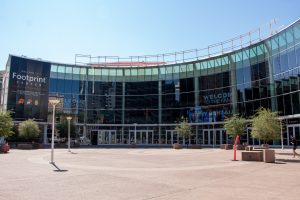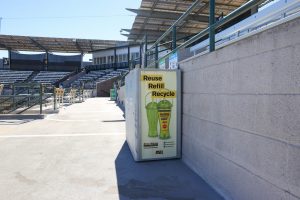- Slug: Sports-Sports Sustainability, 1,560 words.
- 3 photos available.
By Jeremiah Sosa
Cronkite News
PHOENIX – The Phoenix Suns and a plant-based fiber technology and material science company in Gilbert surprised fans in July when they announced a partnership that would change the name of Talking Stick Resort Arena to Footprint Center.
Footprint? Hardly a household name.
But once Suns fans learned more about the company’s goals – to push the boundaries of sustainability to create a healthier planet, including in the team’s 16,645-seat arena in downtown Phoenix – many threw their support behind the change.
It wasn’t the first time that sustainability has intersected with sports in Arizona. In fact, the state’s teams, facilities and events have been at the forefront of implementing sustainable practices. From Footprint Center to Arizona State, from Arizona Athletics to the WM Phoenix Open, the sports industry in the state is seeking a smaller carbon footprint.
The change can be seen in stadiums powered by green energy, concession stands offering fully-vegan food and golf tournaments relying on reusable water.
Sustainability in the pros
Proclaimed the “Greenest Show on Grass,” the WM Phoenix Open is one of the most notable sustainable sporting events in the state.
The week-long tournament consistently attracts more than 700,000 golf fans every year to the TPC Scottsdale Stadium Course.
With such large crowds, the title sponsor, Waste Management, which calls itself North America’s leading provider of integrated environmental solutions, faced a huge challenge to become a zero-waste event, which it did in 2012, the third year of its title association with the tournament.
From 2013 to 2021, it converted 10.4 million pounds of waste into new materials through recycling, composting, donation and reuse, according to Waste Management. Since 2013, the open has held the title of the “largest zero waste sporting event in the world.”
“Everything that you find on the course is either recyclable or compostable, as far as the event materials,” said Janette Micelli, the director of external affairs at Waste Management. “Post tournament, we also do a number of donations to organizations, we store things for reuse, and anything that doesn’t have a home is used to create energy.”
The Suns – now in dogged pursuit of a franchise-first NBA title – hope to challenge the WM Phoenix Open for that title.
Since partnering with Footprint 10 months ago, the Suns have taken steps to turn Footprint Center into one of the most carbon neutral arenas in the NBA. Beginning with the 2021 season, plastic plates, packaging and utensils were replaced with Footprint’s plant-based fiber alternatives.
Footprint also announced it would make the arena a “living innovation lab for food and beverage suppliers” to gauge customer interest, with the goal of going plastic-free.
“We viewed the partnership as an opportunity to touch fans right down the street from where we’re located, and really, we viewed it as an opportunity not just to get feedback from fans on new products and new innovations, but also to educate people in the greater Phoenix area about what it means to be sustainable,” said Heather Knox, senior vice president and head of communications for Footprint.
The company also got rid of all of the trash cans in the building and replaced them with recycling and compost containers.
Sustainability in university athletics
College programs are following suit. In 2014, Arizona State joined the Green Sports Alliance, a trade organization that leverages the cultural and market influence of sports to promote healthy, sustainable communities.
Since joining the partnership, the Sun Devils have earned multiple recognitions for sustainability practices, including two LEED certifications for their athletic facilities – a high recognition from the most widely used green building rating system in the world.
The facilities included the ASU Golf Practice Facility at Papago Park, which received a silver certification in 2020, and Sun Devil Stadium, which was awarded a gold certification before the 2021 football season.
During the 2021 football season, ASU was also named as a “Rising Star” in the Pac-12 Zero Waste Challenge for its efforts during the Sept. 25 game against Colorado. Sun Devils Athletics reached an 81.06% diversion rate, meaning they were able to recycle 8 tons of waste, compost almost 3 tons and reuse more than 2 tons.
The university also learned this week that its sustainability efforts overall ranked it second in the world and first in the U.S. in the Times Higher Education Impact Rankings.
The awards won by ASU have created a spirit of competition among their rivals, chief among them the University of Arizona, that has compelled them to improve their carbon footprints.
“Recognition is a fantastic tool to showcase amazing work and tell the recipients story in a new way, and rankings help spur healthy competition between the Pac-12 teams,” said Kendon Jung, media relations program manager for Zero Waste at ASU. “The annual Zero Waste Challenge helps colleges rank ourselves across the conference to continually improve upon the Pac-12 sustainability goals.”
Although Arizona wasn’t recognized by the Pac-12 during the conference’s Zero Waste Challenge in 2021, it doesn’t mean the university isn’t doing its part when it comes to sustainability. It has made efforts to ensure that some of its buildings and athletic facilities are LEED certified.
Arizona’s Lowell-Stevens Football Facility, which was completed in 2013, is registered with the US Green Building Council and was given LEED Gold status.
“LEED certification is definitely the direction that we’re heading going forward, with all buildings, not only in athletics, but throughout the entire campus,” said Jill Burris, project manager for the University of Arizona in Facilities Management.
Arizona also recently reached an agreement with Tucson Electric Power to obtain all of its grid-based electricity from renewable sources. This partnership between Arizona and TEP is expected to cut the university’s greenhouse gas emission by one third, and save the school millions of dollars throughout the partnership.
Fan education
Making this a greener planet requires changes in human behavior. Fans have to be educated so they can incorporate sustainability practices into their daily lives.
Waste Management’s main fan education program during the open is an initiative, Recycle Right, that teaches fans how to properly dispose of their used materials.
“I’d say with the engagement, the messaging, that’s a big thing that we do, mainly because we feel like recycling is something everybody can achieve every day,” Micelli said.
During the tournament, Waste Management has a section called the WM Green Scene, which features interactive games like cornhole to teach fans about water and emissions management, as well as the proper way to recycle.
“The whole process of zero waste might be overwhelming to a lot of people, but we try to start with that foundational thing around recycling right,” Micelli said.
Footprint Center officials use the center-court scoreboard to educate fans on sustainability in “all of those ways that you can think about kind of touching fans, and educating them about what it means to be sustainable, what they can do at home to take steps to eliminate straws, and plastic bags from the store,” Knox said.
Troy Swope, the co-founder and CEO of Fooprint, said the company is “going to leverage our relationship with the Suns to develop new technologies but ultimately, take plastic out of the stadium as well.”
The arena’s transformation, which began in 2020, included 8,200 tons of material diverted from landfills, 757 tons of plastic and metal recycled and new LED lighting.
Colleges are in a unique position to educate their students because many initially live on campus, which opens the door for them to become educated on sustainable practices.
“We have people come from all over the world to come to the University of Arizona, and we have to start a baseline of what our expectations are of their knowledge of recycling, knowledge of sustainability, knowledge of energy conservation, water conservation and make sure to educate incoming students of what the Wildcat Way is,” Burris said. “That definitely trickles over into athletics when people are at the stadium.”
The future
Being among like-minded organizations provides inspiration from the sustainability efforts of others. And it offers the occasional chance to collaborate directly with one another.
“I feel like anything is possible,” Burris said, “and there’s a lot of collaboration to do the best thing for the environment from solar to waste reduction to education to working with labs.”
Footprint’s biodegradable food service materials have not only made an impact within Footprint Center, but they have also inspired the University of Arizona to look into integrating that technology within their own facilities.
“We need to make sure we get the right material that withstands holding the food, and what is needed from the customer standpoint, and that it biodegrades on the back end,” Burris said. “But, that’s definitely something that is in the works right now.”
Waste Management’s zero waste initiative also has inspired Sun Devil Athletics to continue the process of becoming a zero waste program.
“Key steps to realize this net zero-waste goal include both imbedding reusables into the sporting event experience and working with local market solutions to expand compostable service ware options,” Jung said.
Ultimately, Burris believes the state of Arizona is succeeding in the category of sustainability, mostly because many Arizonans are proud of the state that they live in.
“We realize the resources we have and the beauty of our state, and people want to preserve it,” Burris said. “Arizona has a lot of natural wonders, and beautiful things to be proud of, so we need to make sure they remain for generations to come.”
For more stories from Cronkite News, visit cronkitenews.azpbs.org.


